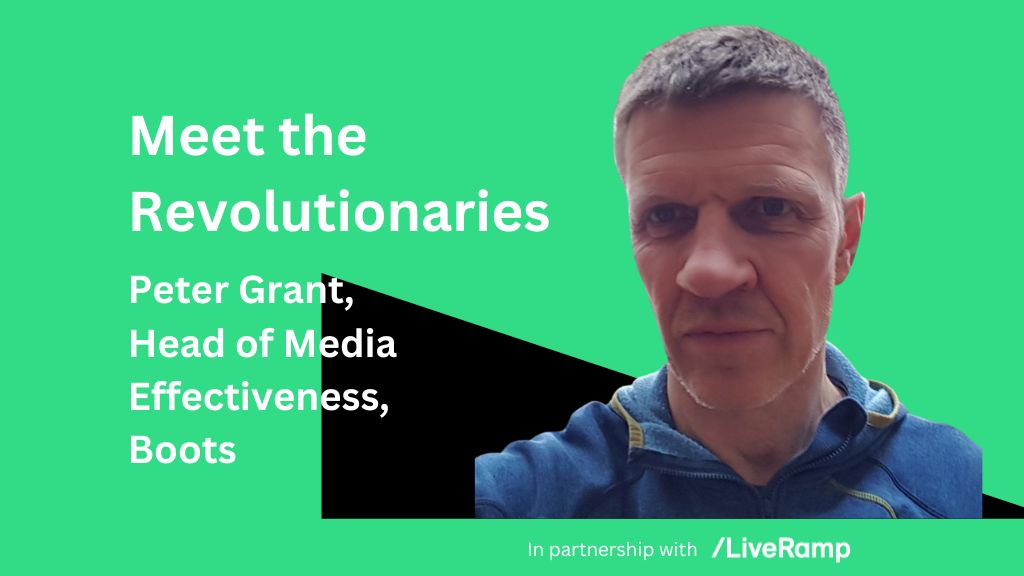New Digital Age (NDA) in association with LiveRamp is spotlighting the men and women championing a data-led revolution in the marketing industry. ‘Meet the Revolutionaries’ focuses on the efforts of the industry executives helping to push digital marketing into a new era of data collaboration.
Here, Peter Grant, Head of Media Effectiveness at Boots, reveals why he’s become “an activist for the liberation of data”…
Tell me about your current role.
As the Head of Media Effectiveness, I’m part of the Marketing team’s chain-of-command, but the nature of the role places it at the Marketing and Finance nexus.
At a high level, I help the business to decide how much money it should invest in marketing on an annual basis. The relationship we have with our Finance team and the conversations we have with them determine the extent to which we’re successful in securing budgets for investment in marketing across any given period of time.
The duties of the role then cascade down through campaigns and channels and tactics and and all of that sort of thing, including when to focus different types of activity throughout the year. I work hand in glove with our media planning teams and with the platforms. We’re always looking at ways of improving performance through efficiency gains and adopting new ways of generating growth.
Can you give an example of a time when you personally have helped to drive innovation?
We went through a big burst of innovation about 18 months ago. My role moved from a central global insights home to the home in marketing I have now. This resulted in improved traction overnight. We started to ask more questions. How can we accelerate what we’re doing here? How can we do things that are different to what everybody else is doing?
I started returning a lot of those calls that you get from agencies who make big claims about being able to measure and improve marketing activity. I thought, okay, let’s chat and see if you can substantiate your claims.
I selected a range of agencies, asked them to sign NDAs and gave them access to data from our biggest campaign of the year, Christmas. A few months later they all came to our HQ in Nottingham and presented back what they had found. Some of the insights were very interesting; others, not so much. That allowed us to whittle down the agency partners we wanted to work moving forward. That approach was a big step change for the company and a big innovation on how we had handled things in the past.
What are the most common challenges to innovation?
It’s a really good question and one I’ve thought a lot about over the years.
Understanding what innovation is, and what it isn’t, is key. Innovation is obviously about change and disruption; it has the promise of a better future. However, embracing innovation usually means that there’s going to be some suffering, pain and sacrifice in the short term. For many people, the most difficult part of innovation is learning to cope with that required level of discomfort.
There are costs associated with any sort of growth. That’s obvious in the context of children growing up or plants and crops growing. It’s the same with innovation and for an individual, the reality is that if you’re going to innovate, you’re going to feel more uncomfortable than you otherwise would. You need to accept that there is going to be discomfort and embrace it. It’s like running a marathon – you can’t expect it to be easy!
What tips can you offer others hoping to drive innovation?
Innovation requires a certain type of person. You need to have courage; you need to have faith; you need to have discipline. You need people who are conscientious. You need creative people and imaginative people who can acknowledge and explain and execute the benefits of innovation.
You need to recruit for it, so that the discipline of innovation becomes a part of your business’s culture.
How do you think digital marketing might evolve over the next few years?
It seems inevitable that everything is becoming digitised, which means more digital data and, for marketers, more opportunity to be distracted by data that doesn’t actually matter. A lot of the data businesses collect and store is junk. As human beings, we filter out 99% of all the information we receive without even realising that we’re doing it. It’s a subconscious act.
In the current marketplace, there’s so much junk in there, that separating the wheat from the chaff is where the opportunity is for most organisations. There’s a misconception that the more data that you have, the higher resolution you have, and the less risk there is in the decisions that you make. The problem is that it’s bollocks.
Even when people acknowledge this, many still can’t drag themselves away from the dopamine hit they get from seeing a whole load of ultimately meaningless metrics.
Do you think ‘data collaboration’ will become more important to marketers?
Absolutely 100%.
I have three ‘pillars’ in my approach to work. The first is ‘Play’ which is at the heart of innovation. Play is about pulling people together, setting the rules and the criteria for success, acknowledging failure, learning and trying again.
The next pillar is ‘focus’, specifically the ability to focus in an increasingly fragmented and atomized world. For marketers, the media landscape has never been more complex, so focus on your goals is crucial.
My final pillar is ‘integration’. I think the businesses that will succeed in the future will be the ones who best liberate their data. I’ve become an activist for data liberation, which is going to be key to maximising the potential of data collaborations.
At the moment, we genuinely don’t know what outcomes might come from merging different data sets. We’ve got a huge CRM database at Boots and right now we’re talking to telecoms, streaming, Finance and many others about, with a view to future collaborations.
Boots is a 175-year-old retailer, so breaking down the data silos in our legacy systems has been a big focus for us in recent years. Marketing roles are becoming increasingly technical. I have more conversations now with lawyers and InfoSec teams and DPOs than I ever would have imagined just a few years ago. That’s all in the pursuit of liberating data and integrating data with third parties. That’s where we believe value, in the future, resides,









